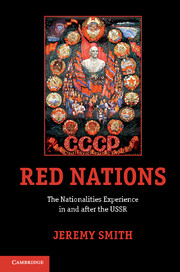Book contents
- Frontmatter
- Dedication
- Contents
- Tables
- Preface
- 1 Introduction: the prison-house of nations
- 2 Dispersal and reunion: revolution and civil war in the borderlands
- 3 Bolshevik nationality policies and the formation of the USSR: the Bolsheviks dispute national policy
- 4 Nation-building the Soviet way
- 5 Surviving the Stalinist onslaught, 1928–1941
- 6 The Great Patriotic War and after
- 7 Deportations
- 8 Territorial expansion and the Baltic exception
- 9 Destalinisation and the revival of the republics
- 10 Stability and national development: the Brezhnev years, 1964–1982
- 11 From reform to dissolution, 1982–1991
- 12 Nation-making in the post-Soviet states
- 13 The orphans of the Soviet Union: Chechnya, Nagorno Karabakh, Abkhazia, South Ossetia and Transdniester
- Conclusion
- Bibliography
- Index
- References
1 - Introduction: the prison-house of nations
Published online by Cambridge University Press: 05 June 2014
- Frontmatter
- Dedication
- Contents
- Tables
- Preface
- 1 Introduction: the prison-house of nations
- 2 Dispersal and reunion: revolution and civil war in the borderlands
- 3 Bolshevik nationality policies and the formation of the USSR: the Bolsheviks dispute national policy
- 4 Nation-building the Soviet way
- 5 Surviving the Stalinist onslaught, 1928–1941
- 6 The Great Patriotic War and after
- 7 Deportations
- 8 Territorial expansion and the Baltic exception
- 9 Destalinisation and the revival of the republics
- 10 Stability and national development: the Brezhnev years, 1964–1982
- 11 From reform to dissolution, 1982–1991
- 12 Nation-making in the post-Soviet states
- 13 The orphans of the Soviet Union: Chechnya, Nagorno Karabakh, Abkhazia, South Ossetia and Transdniester
- Conclusion
- Bibliography
- Index
- References
Summary
In January 1881, Russian soldiers led by General Mikhail Dmitrievich Skobelev stormed the fortress of Gök-Tepe, close to the eastern coastline of the Caspian Sea. Eight thousand Turkmen tribesmen, who had defeated a Russian force two years earlier, lost their lives in the assault, against only 300 Russians. Over the next three years, troops were able to use the fortress as a base to subjugate the oasis of Merv and the town of Kushka. This represented the apogee of the Russian Empire. It was by now the third largest empire in history, surpassed in size only by the Mongol and British empires. It stretched from Poland in the west to the Pacific in the east, and from Finland and the Arctic Sea in the north to the borders of Turkey, Afghanistan and China in the south. The process had begun in the fourteenth century with the ‘gathering of the lands of the Rus’ under the leadership of Muscovy. Ivan III’s conquest of Novgorod in 1478 brought a number of Finno-Ugric people – Votiaks and Cheremis – under Muscovy’s control. When Ivan the Terrible conquered and annexed the Khanate of Kazan in 1552, Muscovy became truly a multi-ethnic empire which held sway over a large number of Muslims as well as Christians and pagans. The Khanate of Astrakhan fell to Ivan four years later, after which he turned his attention to the north, briefly occupying parts of Livonia and Lithuania before defeat at the hands of Sweden and the Polish–Lithuanian Commonwealth forced a retreat. In 1579–1582 a Cossack adventurer, Ermak Timofeevich, accepted a commission from the Stroganovs and, with the backing of the tsar, defeated the khan of the Sibir tribe and began a 300-year expansion of Russia across the Ural mountains and over the vast, sparsely populated expanses of Siberia.
- Type
- Chapter
- Information
- Red NationsThe Nationalities Experience in and after the USSR, pp. 1 - 16Publisher: Cambridge University PressPrint publication year: 2013



